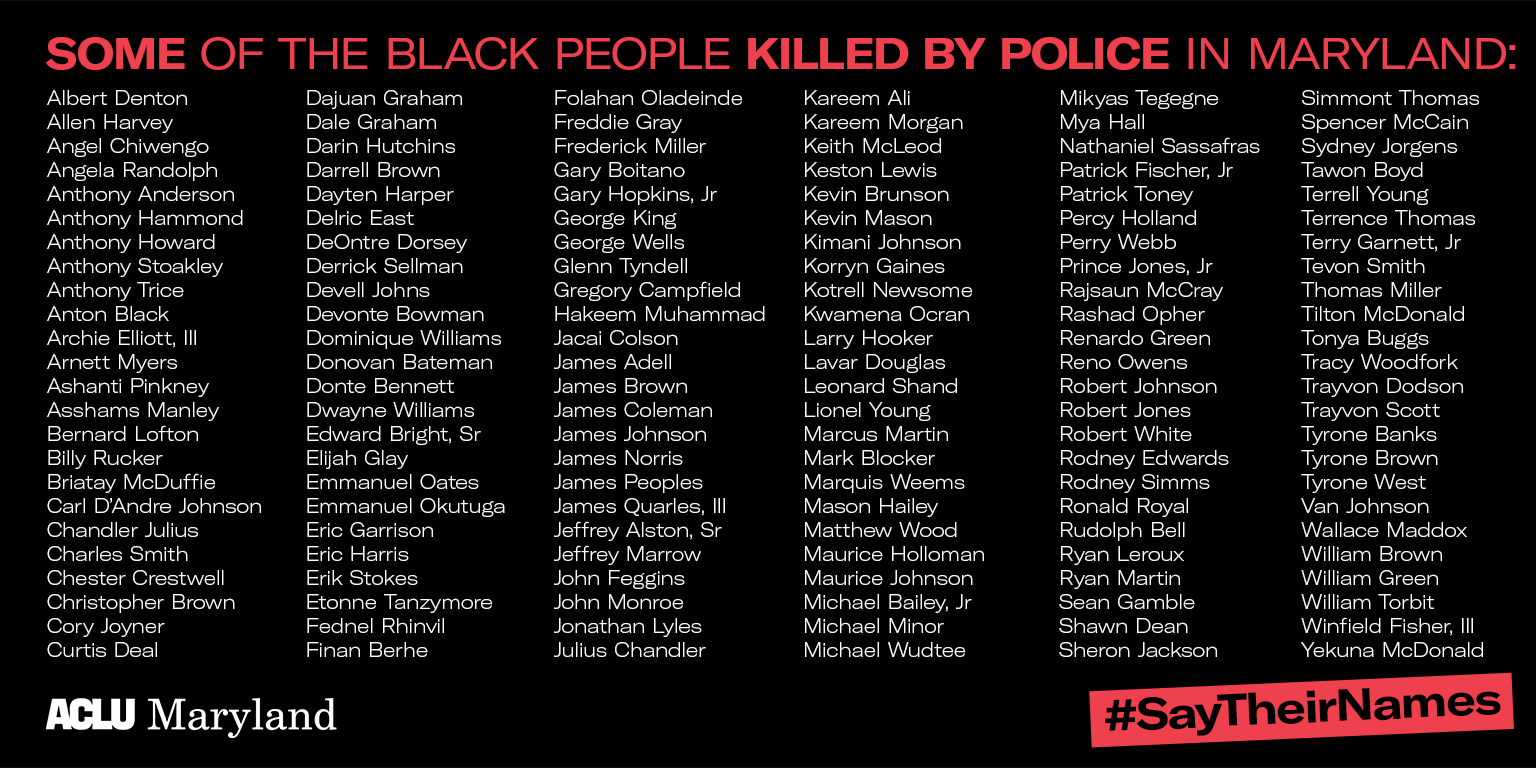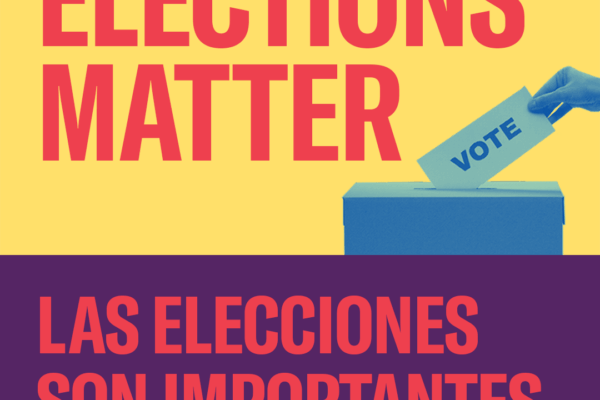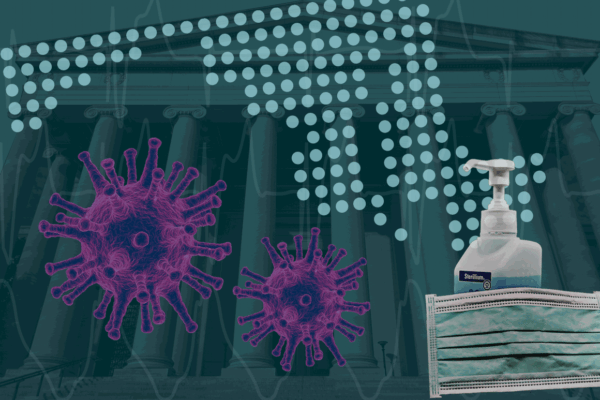There’s No Such Thing as a Dumb Question. (Although, some may be insensitive.)
We get it. When you can’t take a peek backstage, when we only interact through a screen, or when you only get to hear about us when you see a headline or two, it can be confusing and frustrating to understand what the ACLU of Maryland does and why. As a valued supporter, we wanted to give you a special glimpse behind the curtain and answer your most frequent and pressing questions.
Let’s get started.
- I don’t trust mail-in voting. It’s fraudulent. Why are you encouraging it?
Forging a signature on a ballot or mailing in a fraudulent ballot is a serious crime and there are penalties that come with that. There’s not much evidence that this is happening in the country, and no evidence that it’s happened in Maryland. The bigger problem – which is well documented – is that many people with the right to vote don’t have access to the ballot. That is why we believe that during this pandemic, mail-in voting is safer and that its use will encourage the greatest turnout of voters.
- Well, why are you all also encouraging masks? Isn’t the government violating my rights when they require me to wear a mask?
Actually, in current context, the government is protecting you and your rights by requiring everyone to wear masks. A key part of the government’s responsibility is to protect public safety. In the middle of a pandemic, when there is no vaccine, when treatments are still being developed, and when infections and fatalities continue to mount, there are certain limited restrictions that the government can make for the sake of our community. What the ACLU of Maryland hopes to do is make sure that those government policies are informed by science and do not excessively infringe on Marylanders’ rights. Mask requirements do just that. Read more here.
- Well okay, the government may be able to make me wear a mask, but how about when I get blocked or my comments get deleted on my representative’s social media accounts?
It is a violation of the First Amendment for elected officials who represent you to delete your comments or block you just because you disagree with them. However, some instances of censorship are permissible. Most notably, government officials are allowed to regulate comments just like ordinary people do on their own personal or campaign pages. It’s when they use their official accounts to engage with their constituents that they cross the line and are censoring constituent speech. Additionally, using vulgar words or promoting violence are some of the categories where it is permissible for government officials to remove your comments. If you do have a concern that your First Amendment rights were violated, please contact our intake line at (667)-219-2595 x1000 on Tuesdays and Thursdays from 1 to 3. The ACLU cares about this issue, but we are not able to take on every case. Please read the letter that we send people about our social media censoring policy at the very end of the blog to learn more.
- Speaking of your complaint line, I haven’t heard anything back from you. I also haven’t heard anything on the news about you taking up an issue I care deeply about. Don’t you care about my issues or this community’s issues?
First and foremost, your complaint is valid. If you have made a complaint with us, please understand that during this pandemic, it may take months to get a response from us. We are working to close this gap so that months can turn into just a few weeks.
We care deeply about many issues, but we also must respect our own capacity and limitations. We only have 1-3 people on our complaint line at a time and a limited number of staff members working on cases. We hope that the actions we are able to take on some of the cases brought to us have a broader impact and change the lived experiences of all people who have felt excluded from the protections of our legal system. Unfortunately, that doesn’t manifest as being able to represent every person. However, when we can’t help, we still burn a lot of energy trying to refer people elsewhere, like to our amazing partners and organizations that may be better equipped to take on your case.
Also, we do take action on many issues that do not always make the news. We care about LGBTQ+ rights, the rights of disabled people, and so many more people’s rights. We work tirelessly in our state capital to get passed a wide array of bills to protect and advance the rights of Marylanders. We represent people who need or want to keep their legal issues confidential. We work with the community to organize campaigns and protests and build up activists’ groups. We often help community members get results in their case without it resulting in a lawsuit. Sometimes, our work is hidden from the public eye, but we promise that we care deeply about your rights.
- I understand supporting the rights of LGBTQ+ and disabled people, but why are you all advocating for the rights of people who are incarcerated?
Just because a Marylander is found responsible for a crime in the legal justice system does not mean all their rights are suspended. It also does not mean that they can be abused by the government. We focus on protecting the rights of people who are most vulnerable to having their civil rights violated. People who are incarcerated are not in the public’s view, which makes it much easier to violate their rights. Because of their convicted status, there are not many organizations that can offer legal assistance. In the whole state of Maryland, there are only a handful of lawyers and paralegals, including the ACLU, that give legal assistance to people who are incarcerated. We do it because the need is so high.
The ACLU of Maryland is also an institution that prioritizes race equity. The rights of Black, Indigenous, and People of Color are not recognized or applied in the same way as the rights of white people. We stick up for those whose rights are most often trampled. Knowing that there is institutionalized racism within our legal justice system, our focus on the rights of people who are incarcerated is part of our race equity work.
- But shouldn’t we be highlighting and protecting people who are innocent. For example, why did you all include armed Black people in the image below?
Police have proven countless times in Maryland, and around the nation, that they can successfully arrest people alive, even if they are armed or if they have allegedly harmed or killed people. Examples include Benjamin Murdy in Harford County, the shooter in Kenosha, the shooter in El Paso, and the shooter at Emanuel AME Church in Charleston, South Carolina. Unfortunately, most of these examples of police safely detaining people are when the suspect is white.
The same patience police afford to armed white people should be given to Black people – armed or not. We demand limitations on the use of force and insist that de-escalation tactics be used for Black people, too.

- Why was that list a partial list and why weren’t there more Black women on that post?
This list was from around the years of 2014 to 2020, with only a few people listed who were killed earlier than that. We could not include everyone that the police killed because, sadly, there would be so many people that the names would become blurry and wouldn’t fit into the frame anymore.
We also have no doubt that there are more Black women killed by the police in Maryland than are listed here. However, because of misogynoir, the news often doesn’t give the same coverage to the killings of Black women, so they are very hard to track.
- Well, what about other communities of color that get killed by police? Why are we only highlighting Black people?
Black people are disproportionately killed by police. All data points to Black people being the most vulnerable group to police killings – by far. American policing has its roots in catching enslaved people, so it was founded on white supremacy. We hope that through calling out this very long history of police brutality and racism against Black people that we can reimagine the whole system so that public safety is protected for all communities.
- Okay, but I don’t think all cops are bad. Does the ACLU believe all cops are bad?
The answer to this question goes far beyond “good” and “bad” apples. Every week, we receive intake calls from Marylanders about the police profiling, harassing, abusing, and killing Black people. We must see the full picture: Modern day policing combined with the historical knowledge that policing is rooted in slave catching and the violent defense of white property at the expense of Black liberation, together with current knowledge about the police disproportionately abusing and killing Black people. That broad view brings us clearly to the conclusion that the institution of American policing and policing in Maryland is inherently racist and serves as a pillar of white supremacy.
With that being said, we are also defending Black and Latinx police officers who have been trying to change the culture of policing by eliminating white supremacy from their own police departments. They have been punished, ostracized, and retaliated against by other officers, often for efforts to call out abusive behavior against community members. It will take more than a few “good” apples to prevent the bad ones from spoiling the bucket. We are fighting for real, systemic changes in policing.
- I would like to know how I can help out and make a difference in my community.
We would love to let you know how you can take your activism to the next level. Below is a list of actions you could take.
- Join our email list so that you can keep up with what’s going on in your community and take action on police reform, voting, etc.
- We have an Events page on our website where you can learn about protests, education events, and functions where you can get involved.
- Another one of our webpages is called, Take Action, where you can literally pick an issue and just take an action on it, whether that be to sign a petition, write a message to your representative, etc.
- We are always looking for more MD ACLUers. Click here to find job or internship opportunities.
- Follow us on Instagram, Twitter, and Facebook to see what we are up to and spot items you can share to spread the word about issues needing urgent action.
- Listen to our Thinking Freely podcast and read our blogs. We promise to keep you updated on what is your currently going on in your local community and how you can get involved.
- We are a nonprofit that is funded mostly by you. We do not accept any government funding. If you can give back, please visit our Ways to Give webpage to learn how to become a member or donor.
Letter About Social Media Censorship
"Thank you for contacting the ACLU of Maryland concerning the issue of social media censorship by public officials. As you may be aware, the ACLU recently settled a lawsuit about this issue. In the case of Laurenson v. Hogan, a federal lawsuit, the ACLU filed against Maryland Governor Larry Hogan on behalf of constituents whose posts had been deleted and/or who had been blocked from the Governor’s official Facebook page. The ACLU believes that censorship by government entities and representatives on official government social media sites is a violation of both constitutional law and the State of Maryland’s social media policy. Where, as in the case of Maryland’s Governor Hogan, officials embrace social media as a key means of engaging with constituents in their capacity as elected officials, they may not then censor or otherwise disfavor speech simply because they disagree with it. Such discrimination is considered viewpoint-based censorship, and is not tolerated by the First Amendment in any official public forum. Unfortunately, we are unable to provide legal assistance to you at this time.
That being said, it is important to note that different types of social media accounts are treated differently under the law. If, as in the case of Governor Hogan, the Facebook page is identified as an official government page maintained for the purpose of constituent engagement and attended to by government staff – as opposed to a campaign page or personal account, the First Amendment forbids viewpoint-based censorship. On the other hand, speech censorship is allowed on “unofficial” social media accounts such as those created by fans, personal pages, campaign pages, and other accounts that cannot be attributed directly to the government or a public official, acting as a public official. An important first step to determining what your rights are with respect to free speech on the site is making a determination as to whether the social media account you are seeking access to is official or unofficial. Usually, you can do this by looking at the “about” section on the site. Some factors relevant to showing that the cite is an official site include the following:
- Whether the official maintains a separate campaign account and/or personal account;
- The extent to which the official uses the page or account as a means of constituent dialogue;
- Whether the official uses the account to carry out responsibilities as public official, e.g., coordinating disaster relief efforts after a storm or assisting a constituent in addressing a problem;
- Whether the site is used to keep constituents up-to-date on official activities and functions;
- Use of the social media page or account to solicit participation in official initiatives and events;
- Whether the page or account is supported by county resources and created/maintained in part by government staff, as opposed to funded by a campaign and maintained by campaign staff;
- Where the page or account uses an official government title and is categorized as one of a public government official;
- Whether page or account lists a government email address and telephone number as contact information; and
- Whether the page or account links to a government website.
If you have determined that the account you are trying to access is an official one, but you are still experiencing censorship, we offer some suggestions as to steps you might take on your own to address your situation. First, we suggest that you contact the office of the public official and request that you be unblocked from the Facebook page or social media account. We also recommend that you document all interactions with the public official’s office. If initially they are non-responsive, follow up with subsequent requests, and document everything for your records. We also suggest that you preserve any statements on the social media account or any responses by the public official or his/her administration encouraging people to ask questions, comment, or otherwise participate in a dialogue regarding matters of public interest. Likewise, statements on the page that show the official’s administration controls the site, or identifies his/her job title as a public official, are relevant. Because such statements can be removed at any time, it is important to preserve them (by taking screen shots, for example). If you have documented your comments and wish to obtain specific legal advice regarding this issue, you may consider contacting a private attorney. We hope this information is helpful to you."



